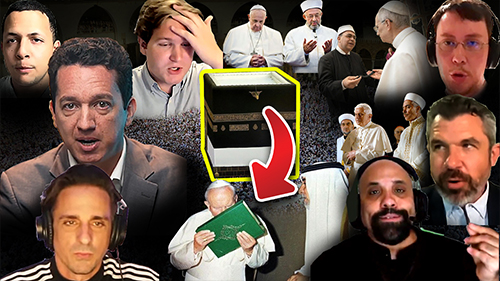| Recent Featured Videos and Articles | Eastern “Orthodoxy” Refuted | How To Avoid Sin | The Antichrist Identified! | What Fake Christians Get Wrong About Ephesians | Why So Many Can't Believe | “Magicians” Prove A Spiritual World Exists | Amazing Evidence For God | News Links |
| Vatican II “Catholic” Church Exposed | Steps To Convert | Outside The Church There Is No Salvation | E-Exchanges | The Holy Rosary | Padre Pio | Traditional Catholic Issues And Groups | Help Save Souls: Donate |  |









 " />
" /> " />
" /> " />
" /> " />
" /> " />
" />




Sess. 7, Can. 4 On The Sacraments – Actually Refutes Baptism of Desire, as Can Be Seen When Compared with Similar Dogmatic Canons on The Sacraments in General
OBJECTION- In Sess. 7, Can. 4 on the Sacraments in General, the Council of Trent teaches that people can obtain justification by the sacraments or the desire for them.
ANSWER- Session 7, Can. 4 on the Sacraments in General says nothing of the sort. An awkward translation of this canon, as well as the mistaken notion that Trent teaches baptism of desire in another place in Trent (which has already been refuted), has led to this erroneous assertion. In fact, we will see that the truth is just the opposite of what the baptism of desire advocates claim. Let’s take a look at the canon.
When one carefully examines this canon, he sees that it is not declaring that either the sacraments or the desire for them is sufficient for justification; but rather it is condemning those who would say that neither the sacraments nor the desire for them is necessary for justification. I repeat, it is not declaring that either is sufficient; it is condemning those who would say neither is necessary. Precisely, it is condemning those who would say that neither is necessary and that faith alone suffices.
Consider the following canon that I have made up: “If anyone says that the Virgin Mary possesses the Queenship of Heaven without God’s permission or her being worthy of it, but assumes this Queenship by usurpation alone, let him be anathema.”
The sentence construction of this imaginary canon is similar to the canon we are discussing. Consider it carefully. After considering it, I ask: does this canon mean that the Blessed Mother possesses her Queenship solely by “her being worthy of it”? No, she must also have God’s permission. The canon does not say that either “her being worthy of it” or “God’s permission” is sufficient for Mary to possess the Queenship. Rather, it condemns those who would say that neither “God’s permission” nor “her being worthy of it” is necessary. In other words, the canon is condemning those who would say that both God’s permission and Mary’s worthiness are useless, since she assumes the Queenship by usurping it.
Likewise, canon 4 above does not say that either the sacraments or the desire for them is sufficient for justification; it condemns those who would say that both the sacraments and the desire are unnecessary in obtaining justification, since faith alone is all one needs. Canon 4 does not in any way teach the possibility of baptism of desire.
ONE CAN SEE THAT THIS CANON ACTUALLY REFUTES BAPTISM OF DESIRE WHEN IT IS COMPARED WITH SIMILAR DOGMATIC CANONS ON THE SACRAMENTS IN GENERAL
Further, since this canon is anathematizing a false position on the necessity of the sacraments in general for justification, what doesn’t hold true for all the sacraments on justification must therefore be qualified in the canon. It is a canon on the sacraments in general. To put it another way, the Council of Trent couldn’t anathematize the statement: “If anyone says that one can obtain justification without the sacraments...” – since, in the case of one sacrament, the Sacrament of Penance, one can obtain justification by the desire for it. The Council of Trent explicitly defined this no fewer than three times.
Therefore, since one can obtain justification without the Sacrament of Penance, in order to make room for this truth in its definition on the Sacraments in General and Justification, the Council had to add the clause “without them or the desire for them” to make its statement applicable to all the sacraments and their necessity or lack thereof for justification.
With this in mind, one can clearly see that Sess. 7, Can. 4 doesn’t assert or state anywhere that one can obtain justification or salvation without the Sacrament of Baptism; it is dealing with a different issue in a very specific context.
To further prove this point, let’s look at two other dogmatic definitions (one from Trent and one from Vatican I) which deal with the sacraments in general and salvation. This comparison will corroborate the point above.
Before we compare these two definitions with Sess. 7, Can. 4 above, the reader must notice that the Councils of Trent and Vatican I infallibly define here that “the sacraments” as such (i.e., the sacramental system as a whole) are necessary for man’s salvation. Both definitions add the qualification that all seven sacraments are not necessary for each individual. This is very interesting and it proves two points:
1) It proves that every man must receive at least one sacrament to be saved; otherwise, “the sacraments” as such (i.e. the sacramental system) couldn’t be said to be necessary for salvation. Hence, this definition shows that each man must at least receive the Sacrament of Baptism in order to be saved.
2) Notice that the Council of Trent and Vatican I made it a special point when defining this truth to emphasize that each person does not need to receive all of the sacraments to be saved! This proves that where exceptions or clarifications are necessary in defining truths, the councils will include them! (That is why the Council of Trent declared that Our Lady was an exception to its Decree on Original Sin). Thus, if some men could be saved without “the sacraments” by “baptism of desire,” then the council could have and would have simply said that; but it didn’t. Nothing about salvation being possible without the sacraments was taught in these dogmatic professions of Faith. Rather, the truth that the sacraments are necessary for salvation was defined, with the necessary and correct qualification that all seven of the sacraments are not necessary for each person.
Now, let’s compare these two definitions with Sess. 7, Can. 4 above. Here are all three:
In comparing these definitions, one notices that Sess. 7, Can. 4 of Trent (the third one) is very similar to the first two dogmatic definitions. In fact, they are almost exactly the same, but with two glaring differences: in the first two dogmatic definitions there is no reference to “without them or the desire for them,” and there is no reference to the topic of justification. The first two definitions are simply dealing with the necessity of the sacraments for salvation, whereas the third (Sess. 7, Can. 4) is dealing with an additional topic: justification and faith alone, and it makes an additional statement about it.
It is blatantly obvious that the phrase “without them or the desire for them” (not found in the first two definitions) has something to do with the additional subject that is addressed here (justification and faith alone), which is not addressed in the first two definitions. In fact, the clause “without them or the desire for them” comes directly after (directly before in the Latin) the reference to justification in Sess. 7, Can. 4! This serves to prove my point above, that the reference to “without them or the desire for them” in Sess. 7, Can. 4 is there to make room for the truth that justification can be obtained without the Sacrament of Penance by the desire for it, which Trent teaches multiple times. That is why this clause “without them or the desire for them” is not mentioned in the first two dogmatic definitions dealing with the sacraments and their necessity for salvation! If baptism of desire were true, the clause “without them or the desire for them” would be included in the first two definitions quoted above, but it isn’t.
Sess. 7, Can. 4 is condemning the Protestant idea that one can be justified without the sacraments or even without the desire for them, by faith alone. Some ask: why didn’t it simply condemn the idea that one can be justified without the sacraments by faith alone? The answer is, as stated above, because a person can be justified without the Sacrament of Penance by the desire for it! Therefore, Trent condemned the Protestant idea that one can be justified without the sacraments or without the desire for them by faith alone. But a person can never be saved without incorporation into the sacramental system through the reception of Baptism. That is why no qualification was made in this regard in any of these definitions. Considering these facts, one can see that this canon is not in any way teaching baptism of desire.
In fact, when looking at Sess. 7, Can. 4 again, we notice something else that is very interesting. Notice that not just the profession of Faith from Trent and Vatican I, but also Sess. 7, Can. 4 condemns anyone who says that the sacraments of the New Law are not necessary for salvation. It adds no qualification, except that all seven are not necessary for each individual.
After declaring that the sacraments are necessary for salvation (baptism of desire is not a sacrament), it adds at the end the qualification (as the other definitions did) that all seven are not necessary for each individual! But it adds no qualification that salvation can be attained by the desire for the sacraments in general. Notice that it DOESN’T SAY:
It doesn’t say this at all. The “desire for them” was coupled with the reference to justification for the reason discussed above. All of this serves to prove again that the Council of Trent didn’t teach baptism of desire, contrary to what so many have asserted.
Some may object that this seems rather complicated. It really isn’t complicated for anyone who thinks about it carefully. And if it is complicated, it is complicated by the people who deny the simple truth that one must be baptized to be saved, and who tenaciously assert that it is not necessary for all to be born again of water and the Holy Ghost. Those who misunderstand or stray from the straightforward and totally simple truth (defined in the Canons on the Sacrament of Baptism) are the ones who make it complicated and burdensome to refute their errors and/or perversions of the truth. If people simply repeated and adhered to the truths defined in the Canons on the Sacrament of Baptism it would be very simple.
The Council of Trent had every opportunity to declare: “If anyone shall say that there are not three ways of receiving the grace of the Sacrament of Baptism, by desire, by blood or by water, let him be anathema,” but it never did. Rather, it declared:
[1] Decrees of the Ecumenical Councils, Vol. 2, p. 684; Denzinger 847.
[2] Denzinger 898.
[3] Denzinger 996.
[4] Decrees of the Ecumenical Councils, Vol. 2, p. 803.
[5] Denzinger 996.
[6] Decrees of the Ecumenical Councils, Vol. 2, p. 803.
[7] Denzinger 847.
[8] Denzinger 847.
[9] Denzinger 858.
[10] Denzinger 861.
Sign up for our free e-mail list to see future vaticancatholic.com videos and articles.
Recent Content
^